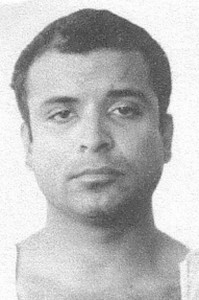 In the light of revelations in US courts in the drug case of businessman Roger Khan linking him to at least two high profile killings, government on Wednesday said that once evidence is shared with local law enforcement it would investigate.
In the light of revelations in US courts in the drug case of businessman Roger Khan linking him to at least two high profile killings, government on Wednesday said that once evidence is shared with local law enforcement it would investigate.
President Bharrat Jagdeo made this assertion at a press conference on Wednesday following enquiries from reporters. He also said no evidence has been supplied to Guyana even though the US prosecution linked Khan to the murders of Davendra Persaud and boxing coach Donald Allison. Jagdeo told reporters that his government does not have information from the United States to support any of the utterances made as that country continues to build its case against Khan. “If we have any details about how they came upon this evidence or what evidence they have then I think the police should follow it up to the conclusion, although he [Khan] is not here in our jurisdiction,” Jagdeo reiterated. He said the local law enforcement agency is obligated to pursue any evidence about Khan’s involvement in any criminal act.
At the same time, Jagdeo recalled the issue of extradition saying it was “bandied” around that the US had wanted 14 persons from Guyana but no such request was ever submitted by the US authorities. Jagdeo said “Many people thought we were not moving on this but they had never made any requests.” The president also said he has not asked acting Commissioner of Police Henry Greene about the recent revelations being made in the US, since he felt it was a court matter. “I don’t know of any information shared with us, direct information saying we know he did this and this is the evidence we have supporting the contention that he killed this person or that person or ordered a hit on this person or that person,” he explained.
The prosecution in Khan’s drug trial on Tuesday released a memorandum of law submitted in support of its motion for a pre-trial ruling to admit evidence regarding uncharged criminal activity by Khan. According to the memorandum, Khan, indicted for trafficking of cocaine in the US, ordered the murder of Persaud and Allison. The document was filed in the New York Eastern District Court on Monday and seeks to have the court admit at trial evidence of Khan’s retaliation against Persaud, who was once a part of his organisation. His retaliation included threats to Persaud and his family, seizing his car and ultimately, ordering that he be murdered. Khan’s conduct in this regard, the prosecution said, though not charged in the indictment, constituted direct proof of his continuing criminal enterprise and narcotics conspiracy.
Further, the prosecution gave notice that it would seek to offer evidence of Khan’s criminal conduct in Vermont and subsequent bail jumping if necessary to rebut arguments advanced by Khan, including lack of knowledge of drug trafficking, pursuant to Rule 404(b). The prosecution also plans to establish that Khan was the leader of a violent drug trafficking organisation (the “Khan Organisa-tion”) that was based in Georgetown, from at least 2001 until his arrest in June 2006.
“Khan and his co-conspirators obtained large quantities of cocaine, and then imported the cocaine into the Eastern District of New York, among other places, where it was further distributed,” the memorandum said. “Khan was ultimately able to control the cocaine industry in Guyana, in large part because he was backed by a para-military squad”.
As regard Allison’s murder, the prosecution said it expected to prove at trial, primarily through the testimony of cooperating witnesses and related corroborating information, that Allison, who lived in Guyana, and others, imported cocaine into the United States that was obtained from the Khan Organisation. Some of this cocaine was seized in the US, the document said, and Khan suspected that Allison and his co-conspirators had stolen it. Khan then tried to recruit Allison, but Allison refused and on at least one occasion insulted Khan in a public place, the memorandum said, and Khan threatened that he would kill Allison. Subse-quently, Allison was shot and killed.
Individuals in the cocaine industry in Guyana, including Khan, the document said, suspected that Persaud was cooperating with US law enforcement.
The prosecution argued that the threats to Persaud and his family, the taking of Persaud’s car and his murder and that of Allison, while uncharged, were admissible as direct evidence of the accused’s continuing criminal enterprise and narcotics conspiracy.
It quoted sections of US law under which this was admissible and cited previous cases where such evidence had been admitted. It said that Khan’s alleged ordering of the murders was proof of his leadership role in the conspiracy.





